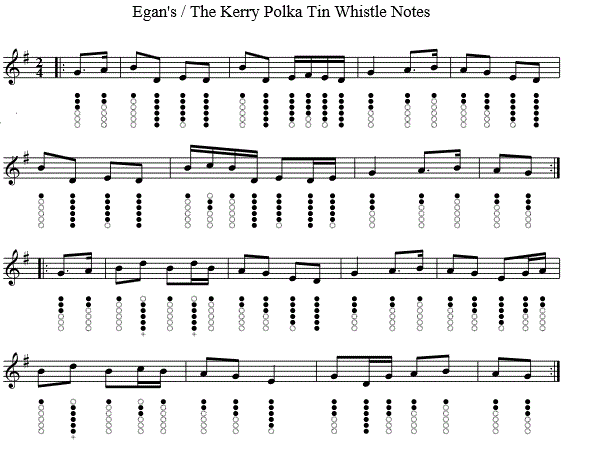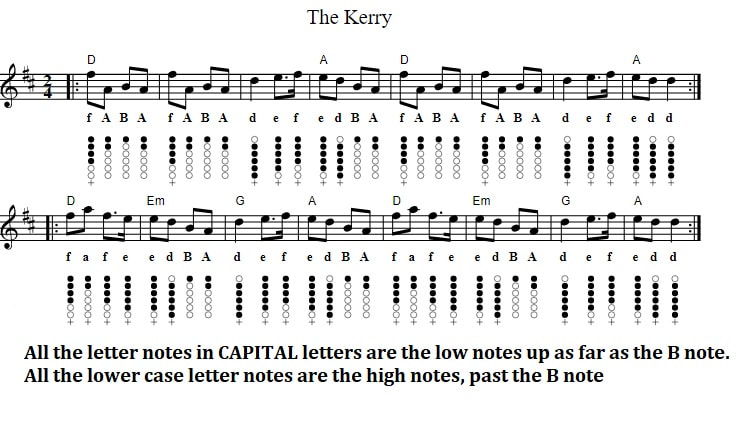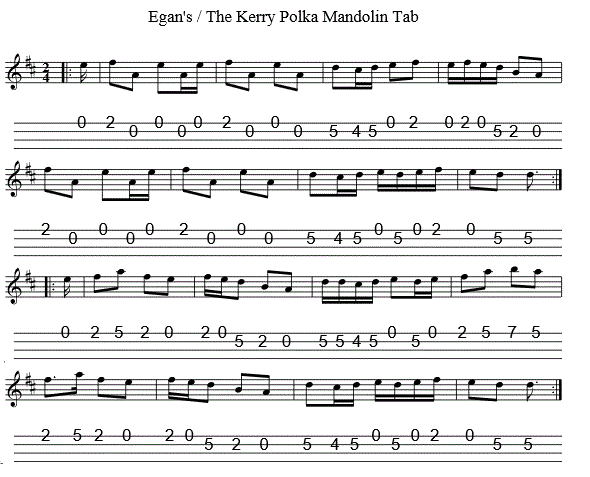The Kerry Polka Tin Whistle Sheet Music
Although I'm sure the right name for this tune is Egan's Polka it's been know for years as The Kerry Polka. The mandolin / banjo tab is included and the notes are slightly higher than the first piece of music. This tune about the Kingdom is part of the list of Traditional Irish sheet music included here.The Kerry Polka sheet music with letter notes and guitar chords is now included . PDF file included.
The Kerry Polka tune is a lively and popular Irish dance melody that has been played and enjoyed for over a century. It is a traditional tune that originated in the southwest region of Ireland, specifically in the county of Kerry. The tune is a testament to the rich cultural heritage of Ireland and has become an integral part of Irish music, being played and enjoyed not only in Ireland but also in many other parts of the world.
The Kerry Polka tune is a two-part tune that is typically played in a 2/4 time signature. It is characterized by its upbeat and lively rhythm, with a quick tempo that makes it perfect for dancing. The tune is usually played on traditional Irish instruments such as the fiddle, accordion, and tin whistle, but it has also been adapted for other instruments such as the guitar and the banjo.
The origins of the Kerry Polka tune can be traced back to the 19th century. It is believed that the tune was first composed by a man named Paddy Connor, who was a fiddle player from County Kerry. However, there is some debate about this, as there are also claims that the tune was originally a Scottish tune that was brought to Ireland by Scottish immigrants. Regardless of its exact origins, the Kerry Polka tune quickly gained popularity in the county of Kerry and soon spread throughout the rest of Ireland.
The Kerry Polka tune became a staple in Irish music sessions, where musicians would gather to play traditional tunes. It was also a popular tune for set dances, which are traditional Irish dances performed in a group. The lively rhythm and catchy melody of the Kerry Polka tune made it a favorite among dancers, and it soon became a regular feature in Irish dancehalls.
In the 20th century, the Kerry Polka tune gained even more popularity when it was recorded by various Irish musicians. One of the most well-known recordings of the tune was by the famous Irish accordion player, Joe Burke, who recorded it in 1965. The tune was also recorded by other notable Irish musicians such as The Chieftains and The Dubliners, further cementing its place in Irish music.
The Kerry Polka tune has also made its way into other genres of music. In the 1970s, it was adapted by country music singer George Hamilton IV, who recorded it as a country song titled 'The Kerry Polka (The South Wind).' The tune has also been incorporated into American bluegrass music, with famous bluegrass bands such as The Stanley Brothers and The Dillards recording their own versions of the tune.
One of the reasons for the enduring popularity of the Kerry Polka tune is its versatility. The tune can be played at different tempos and can be adapted to different styles of music, making it a favorite among musicians of all genres. Its infectious rhythm and catchy melody also make it a favorite among listeners, who often find themselves tapping their feet and clapping along to the tune.
The Kerry Polka tune has also become a symbol of Irish identity and culture. It is often played at Irish cultural events and festivals, and its popularity has spread beyond the borders of Ireland. Many Irish immigrants have brought the tune with them to their new homes, making it a part of their new cultural identity. The tune has also been featured in various movies and television shows, further solidifying its place in popular culture.
In conclusion, the Kerry Polka tune is a beloved and iconic tune that has stood the test of time. Its origins may be debated, but its impact on Irish music and culture is undeniable. From its humble beginnings in County Kerry, the tune has spread throughout the world, becoming a symbol of Irish music and identity. Its lively rhythm and catchy melody will continue to be played and enjoyed for generations to come, ensuring that the Kerry Polka tune remains an integral part of Irish music and culture.
The Kerry Polka tune is a two-part tune that is typically played in a 2/4 time signature. It is characterized by its upbeat and lively rhythm, with a quick tempo that makes it perfect for dancing. The tune is usually played on traditional Irish instruments such as the fiddle, accordion, and tin whistle, but it has also been adapted for other instruments such as the guitar and the banjo.
The origins of the Kerry Polka tune can be traced back to the 19th century. It is believed that the tune was first composed by a man named Paddy Connor, who was a fiddle player from County Kerry. However, there is some debate about this, as there are also claims that the tune was originally a Scottish tune that was brought to Ireland by Scottish immigrants. Regardless of its exact origins, the Kerry Polka tune quickly gained popularity in the county of Kerry and soon spread throughout the rest of Ireland.
The Kerry Polka tune became a staple in Irish music sessions, where musicians would gather to play traditional tunes. It was also a popular tune for set dances, which are traditional Irish dances performed in a group. The lively rhythm and catchy melody of the Kerry Polka tune made it a favorite among dancers, and it soon became a regular feature in Irish dancehalls.
In the 20th century, the Kerry Polka tune gained even more popularity when it was recorded by various Irish musicians. One of the most well-known recordings of the tune was by the famous Irish accordion player, Joe Burke, who recorded it in 1965. The tune was also recorded by other notable Irish musicians such as The Chieftains and The Dubliners, further cementing its place in Irish music.
The Kerry Polka tune has also made its way into other genres of music. In the 1970s, it was adapted by country music singer George Hamilton IV, who recorded it as a country song titled 'The Kerry Polka (The South Wind).' The tune has also been incorporated into American bluegrass music, with famous bluegrass bands such as The Stanley Brothers and The Dillards recording their own versions of the tune.
One of the reasons for the enduring popularity of the Kerry Polka tune is its versatility. The tune can be played at different tempos and can be adapted to different styles of music, making it a favorite among musicians of all genres. Its infectious rhythm and catchy melody also make it a favorite among listeners, who often find themselves tapping their feet and clapping along to the tune.
The Kerry Polka tune has also become a symbol of Irish identity and culture. It is often played at Irish cultural events and festivals, and its popularity has spread beyond the borders of Ireland. Many Irish immigrants have brought the tune with them to their new homes, making it a part of their new cultural identity. The tune has also been featured in various movies and television shows, further solidifying its place in popular culture.
In conclusion, the Kerry Polka tune is a beloved and iconic tune that has stood the test of time. Its origins may be debated, but its impact on Irish music and culture is undeniable. From its humble beginnings in County Kerry, the tune has spread throughout the world, becoming a symbol of Irish music and identity. Its lively rhythm and catchy melody will continue to be played and enjoyed for generations to come, ensuring that the Kerry Polka tune remains an integral part of Irish music and culture.
| the-kerry-polka-tin-whistle-notes-pdf-file.pdf |
Below is the list of sheet music and tin whistle songs that are in my ebooks. This is the largest collection of tin whistle songs ever put together.[over 800 songs ] Including folk, pop and trad tunes plus German And French songs along with Christmas Carols.
All of the sheet music tabs have been made as easy to play as was possible.
The price of the ebooks is €7.50
All of the sheet music tabs have been made as easy to play as was possible.
The price of the ebooks is €7.50
Scroll down to see the full list of songs in the PDF




